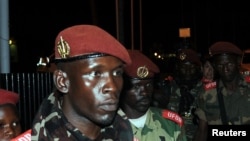DAKAR —
The government of the Central African Republic is condemning recent advances by the Seleka rebel coalition, who retain de-facto control over parts of the north and have seized new territory in the past week. Both sides accuse the other of not fully respecting the terms of a January 11th peace accord.
Fighters from the Seleka rebel coalition seized the southeastern towns of Bangoussou and Gambo on March 11 and then the nearby town of Rafai the following day. The advance came exactly two months after Seleka's leaders had signed a peace deal with the government.
That deal, signed in Libreville, Gabon, now looks to be on shaky ground.
The accord brought an end to a tense, month-long rebel offensive that threatened to topple the government in the capital, Bangui.
CAR government spokesman Crépin Mboli-Goumba said Wednesday that "nothing can justify" the recent rebel attacks.
He says they all pledged in front of the world that they could resolve their differences by dialogue but recent events have called that into question. He says the government has still not been able to begin troop billeting, a first step toward disarming and reintegrating rebel fighters and something he says would be "a strong signal towards peace."
Mboli-Goumba said no peace accord is perfect but what counts is the will to stick to it.
The Seleka rebel alliance unites at least three rebel groups in the north who say the government failed to implement peace deals signed in 2007 and 2011 that included paying rebel fighters and integrating them into the army.
The Seleka alliance is relatively new and is seen as more of a marriage of convenience. Analysts say a disconnect between the aspirations of rebel leaders and those of their rank-and-file fighters have undermined the implementation of previous peace deals.
The government blames dissident rebel factions for the raids that have plagued the country since the signing of the Libreville accord.
In written statements released this month, the Seleka coalition said the government has not lived up to certain provisions of the accord, including the release of hundreds of political prisoners and the departure of South African troops currently securing the government in the capital.
The envoy of regional mediators, Republic of Congo President Denis Sassou-Nguesso, has been in Bangui since Friday to meet with all sides and review the implementation of the Libreville accord.
Jose Richard Pouambi contributed to this report from Bangui.
Fighters from the Seleka rebel coalition seized the southeastern towns of Bangoussou and Gambo on March 11 and then the nearby town of Rafai the following day. The advance came exactly two months after Seleka's leaders had signed a peace deal with the government.
That deal, signed in Libreville, Gabon, now looks to be on shaky ground.
The accord brought an end to a tense, month-long rebel offensive that threatened to topple the government in the capital, Bangui.
CAR government spokesman Crépin Mboli-Goumba said Wednesday that "nothing can justify" the recent rebel attacks.
He says they all pledged in front of the world that they could resolve their differences by dialogue but recent events have called that into question. He says the government has still not been able to begin troop billeting, a first step toward disarming and reintegrating rebel fighters and something he says would be "a strong signal towards peace."
Mboli-Goumba said no peace accord is perfect but what counts is the will to stick to it.
The Seleka rebel alliance unites at least three rebel groups in the north who say the government failed to implement peace deals signed in 2007 and 2011 that included paying rebel fighters and integrating them into the army.
The Seleka alliance is relatively new and is seen as more of a marriage of convenience. Analysts say a disconnect between the aspirations of rebel leaders and those of their rank-and-file fighters have undermined the implementation of previous peace deals.
The government blames dissident rebel factions for the raids that have plagued the country since the signing of the Libreville accord.
In written statements released this month, the Seleka coalition said the government has not lived up to certain provisions of the accord, including the release of hundreds of political prisoners and the departure of South African troops currently securing the government in the capital.
The envoy of regional mediators, Republic of Congo President Denis Sassou-Nguesso, has been in Bangui since Friday to meet with all sides and review the implementation of the Libreville accord.
Jose Richard Pouambi contributed to this report from Bangui.









